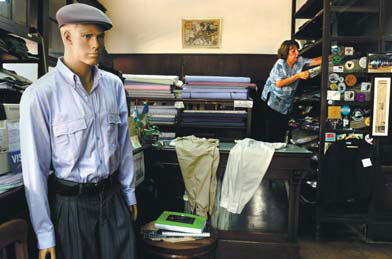Argentine gauchos cling to trademark riding pants
Updated: 2013-02-20 09:35
(China Daily/Agencies)
|
||||||||
Argentina's gauchos, or cowboys, are a proud lot. As economic forces trigger changes in agriculture - namely a big rise in soybean farming - they are having to fight harder to preserve their century-old lifestyle, including the trademark bombacha, or baggy riding pants.
Famed for their horsemanship, these rugged cowboys of the central Pampas - vast, fertile plains and grasslands - helped defeat Spanish troops and win Argentine independence in the 19th century.
|
 |
| Mirta works at the Carpenters store and bombachas (baggy trousers used by the gauchos) factory in Buenos Aires in November. Daniel Garcia / Agenec France-Presse |
But today, as mechanized soybean farming increasingly encroaches on pasture land, the gauchos are under pressure and doggedly trying to keep alive the bombacha-making business.
"There is a deep loss of identity, but people are resisting. They want to preserve this lifestyle," said 74-year-old Jose Peluffo as he showed off his collections of bombachas in his homestead in Ayacucho, 366 km south of Buenos Aires in the heart of the Pampas.
From his grandfather Serafin, he picked up a taste for the most traditional form of the loose pants, still tailor-made by a Buenos Aires store called Carpenters and founded in 1888 by a French family.
"I am used to wearing the bombacha. It is really comfortable, and I wear it with pride," he added, recalling that he ordered his first pair in that store at the age of 16.
"This suit, with the waisted jacket, is my favorite to go to farm meetings," he added.
Since 2003, skyrocketing soybean prices have led to 11,000 sq km of arable land being switched from cattle-raising to farming, threatening the gaucho culture.
In the central plains, chief herdsmen and horse tamers are now hard to find.
These skilled jobs are now being pushed to peripheral regions, less adapted to soybean growing, such as the northeastern province of Corrientes.
But bombacha-making is holding firm, even in the middle of the Pampas, in large part due to the popularity of the Carpenters store, which even attracts foreign tourists.
"I sense that it will never disappear," said 57-year-old store owner Juan Robiglio said of the garment as he stood behind a quaint, wooden counter in Buenos Aires' old Montserrat district.
"The bombacha requires a lot of work," said a seamstress named Carmen, who would not give her last name.
"This one has five pockets, while the machine-made one has only three and no buttonhole or button," she added.
The trousers must custom-fit the client, and each region has a different style. The further north you go, the wider they get.
Founded by Frenchman Louis Pot and later managed by two other compatriots, Jean Maynard and Jules Febre, Carpenters owes its name to its first success: work pants made for carpenters.
But the French owners quickly realized that the future of their business lay with the bombacha.
At the end of the Crimean War in 1856, another Frenchman, diplomat Charles Lefebvre de Becourt, offered Argentina a stock of 100,000 pairs of loose pants initially ordered by the Turkish army in exchange for local products.
The offer was accepted, and the country quickly adopted the bombacha, ideal for horse riding.
For Peluffo as for many other Argentineans, wearing a tailored-made bombacha is their way of holding off the spread of transgenic plants and globalization.
Agence France-Presse

 Li Na on Time cover, makes influential 100 list
Li Na on Time cover, makes influential 100 list
 FBI releases photos of 2 Boston bombings suspects
FBI releases photos of 2 Boston bombings suspects
 World's wackiest hairstyles
World's wackiest hairstyles
 Sandstorms strike Northwest China
Sandstorms strike Northwest China
 Never-seen photos of Madonna on display
Never-seen photos of Madonna on display
 H7N9 outbreak linked to waterfowl migration
H7N9 outbreak linked to waterfowl migration
 Dozens feared dead in Texas plant blast
Dozens feared dead in Texas plant blast
 Venezuelan court rules out manual votes counting
Venezuelan court rules out manual votes counting
Most Viewed
Editor's Picks

|

|

|

|

|

|
Today's Top News
Live report: 7.0-magnitude quake hits Sichuan, heavy casualties feared
Boston suspect cornered on boat
Cross-talk artist helps to spread the word
'Green' awareness levels drop in Beijing
Palace Museum spruces up
First couple on Time's list of most influential
H7N9 flu transmission studied
Trading channels 'need to broaden'
US Weekly

|

|







